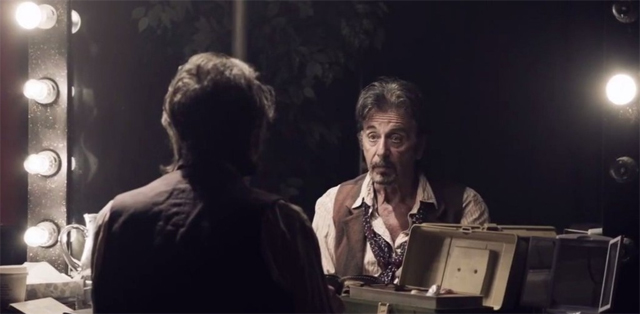The Humbling
Written for the screen by Buck Henry and Michal Zebede
Directed by Barry Levinson
USA, 2014
In 2009, New York Times book critic Michiko Kakutani referred to Philip Roth’s novella The Humbling as “an overstuffed short story, […] a slight, disposable work about an aging man’s efforts to grapple with time and loss and mortality, and the frustrations of getting old.” In 2015, that sentiment rings just as true of Barry Levinson’s adaptation of the same work. The Humbling runs too long, dawdles too much, makes hollow caricatures of its women, and muddles its intentions. Its most redeeming features are its performances; Al Pacino is in top form, with Greta Gerwig playfully keeping up. But neither can elevate this failed attempt at pathos above what it is: bland.
We open on Pacino, as legendary actor Simon Axler, readying himself for the stage. He paints his face, and recites his lines, as if coaching himself through the mirror. It’s immediately evident that this is a Pacino performance we’ve not seen in many moons: understated is back. As he readies himself, it becomes clear that Axler is having a panic attack. Daydreaming about his own irrelevance, he forces himself to the stage, where he promptly nosedives, literally, into the orchestra. So begins his meditation on purpose and age.
After narrowly avoiding his own suicide, he admits himself to a posh mental facility for the rich and famous. Coping with his feelings of inadequacy laced with his dwindling grasp on reality, he returns home to find himself feeling even more impotent and alone. And then Pegeen (Gerwig) arrives. The daughter of old actor friends, Pegeen is now a professor of drama at a nearby college. She carelessly thrusts herself into his life, and into his bed, in what can only be construed as a fiendish attempt to take the poor dolt for all he’s worth. Painfully awkward calamity ensues.
From the beginning, the tone of The Humbling is as much a moving target as Pegeen’s sexuality. It opens dark yet tender, painting a portrait of a confused older man, grappling with his own mortality. Just as quickly, it loses all poignancy in favor of poorly executed silliness that masquerades as comedy. While some moments are undeniably dark and witty, those rare gems are overshadowed by clumsiness.
The humor attempts a Woody Allen-esque tone without any of the substance, and plays a little too fast and loose with the suggestion of Axler’s potential dementia. A subject that doesn’t seem prominent in Roth’s original novella, Axler’s waning grasp on reality is abused and misrepresented. It feels more like an insensitive joke than any legitimate dialogue on mental illness.
And then we have Pegeen, the woman who, in Roth’s novella, is a 40-year-old lesbian who introduces a world of wild, indulgent sex to Axler. Here, she is barely over 30, and the most sexually charged we ever see them is in a dream sequence where Axler hallucinates Pegeen with another woman. What’s worse is that Pegeen is portrayed as an infantile woman more intent on sleeping her way to success than actually working for anything. She’s just one of three hollow caricatures of women that pepper both Roth’s original story and Levinson’s adaptation. That Gerwig ever agreed to this still seems confusing.
Yet, praise must be given where praise is due. With what little she’s given, Gerwig does a good job. She fleshes out a poorly written character with zeal, and clearly enjoyed every minute of it. What’s more impressive is she holds her own against Pacino, who is in top form. The film may falter, and the writing may be lackluster, but Pacino brings Axler to life in a way that salvages many of the film’s shortcomings. Through a surprisingly nuanced performance, Pacino uses The Humbling, perhaps consciously, as a vessel whereby he can scrutinize his own relevance.
Quite like Birdman before it, there’s a prominent and pertinent dialogue on the role of the aging actor in an increasingly youth-centric society where relevance is the only barometer of success. Unlike Birdman before it, The Humbling stumbles over its own ambition, and misses its own point. It’s executed in a manner that betrays its own potential, and ironically undercuts its own relevance.
— Ariel Fisher




